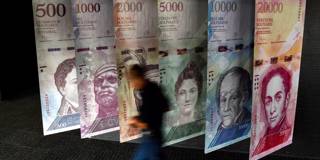Venezuela’s latest expected debt default raises the question of whether creditors should bear the risk that unauthorized debts can be repudiated. In the final analysis, imposing some risk on careless creditors may be the best way to ensure that politicians honor the limits on their borrowing authority.
DURHAM/GENEVA/CHAPEL HILL – In late October, Venezuela is likely to default on a $913 million payment on a key bond. Because the country has already defaulted on most of its debt, one might be tempted to regard another missed payment as no big deal. But this bond, issued by the national oil company Petróleos de Venezuela, S.A. (PDVSA), and referred to as PDVSA 2020, is backed by juicy collateral: a controlling stake in Venezuela’s economic crown jewel, United States-based refiner CITGO.
Ordinarily, unpaid bondholders could tell the bond trustee to seize the collateral. But, given its dubious provenance, the PDVSA 2020 is no ordinary bond. It was issued in 2016, when PDVSA was close to default. To buy time, the company swapped short-maturity bonds for this longer-maturity one. In exchange, creditors received collateral in the form of a 50.1% interest in CITGO’s parent company.
The transaction was unusual in at least one respect. The Venezuelan Constitution requires the country’s National Assembly to approve contracts of national interest. But the opposition-controlled legislature did not approve this bond issue, which it undoubtedly viewed as an attempt by President Nicolás Maduro’s government to buy time for itself.

DURHAM/GENEVA/CHAPEL HILL – In late October, Venezuela is likely to default on a $913 million payment on a key bond. Because the country has already defaulted on most of its debt, one might be tempted to regard another missed payment as no big deal. But this bond, issued by the national oil company Petróleos de Venezuela, S.A. (PDVSA), and referred to as PDVSA 2020, is backed by juicy collateral: a controlling stake in Venezuela’s economic crown jewel, United States-based refiner CITGO.
Ordinarily, unpaid bondholders could tell the bond trustee to seize the collateral. But, given its dubious provenance, the PDVSA 2020 is no ordinary bond. It was issued in 2016, when PDVSA was close to default. To buy time, the company swapped short-maturity bonds for this longer-maturity one. In exchange, creditors received collateral in the form of a 50.1% interest in CITGO’s parent company.
The transaction was unusual in at least one respect. The Venezuelan Constitution requires the country’s National Assembly to approve contracts of national interest. But the opposition-controlled legislature did not approve this bond issue, which it undoubtedly viewed as an attempt by President Nicolás Maduro’s government to buy time for itself.